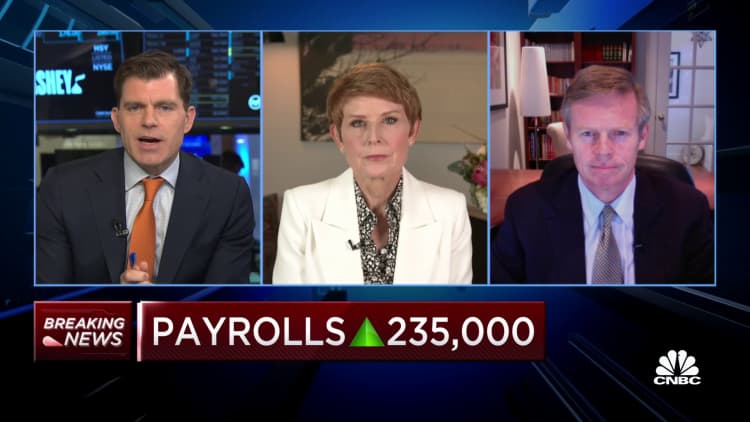
The Dow Jones Industrial Average retreated on Friday and the S&P 500 slipped from a record high after the August jobs report came in short of expectations, showing the impact of the delta-fueled Covid resurgence.
The Dow lost 74.73 points, or 0.21%, to 35,369.09, while the S&P 500 edged lower by 0.03% to 4,535.43 after holding a slight gain in afternoon trading. The broader market index was supported by tech stocks, which helped to lift the Nasdaq Composite by 0.21% to 15,363.52.
Nonfarm payrolls increased by 235,000 in August, the Labor Department said Friday. Economists surveyed by Down Jones were expecting 720,000 jobs. The report marks a significant slowdown from July's revised number of 1.053 million and comes as the delta variant of Covid-19 has led to health restrictions being put back in place in some states and cities.
Federal Reserve Chairman Jerome Powell has emphasized the need for more strong jobs data before the central bank would start to unwind its massive bond-buying program, and the disappointing report could change expectations about when the Fed will start its tapering process.
"A surprisingly low jobs number this morning clouds the tapering outlook considerably as only 235k jobs were added in August, likely giving the Fed pause and pushing out their plans to announce their bond taper plans," Chris Zaccarelli, chief investment officer for Independent Advisor Alliance, said in a note. "Many people believed that the Fed would announce their taper plans at this month's FOMC meeting and that is no longer likely."
The report raises questions about the long-term growth trajectory for the U.S. economy, but the impact of the Fed appeared to be offsetting that in Friday's trading, said Yung-Yu Ma, the chief investment strategist at BMO Wealth Management.
"The early reaction was more difficult, but there's at least some comfort now that the Fed pushing back tapering, and maybe increasing accommodation for longer in general, is at least giving the market some comfort," Ma said.
The central bank will also be looking at how much Covid impacted hiring and activity during August. The virus variant has been a wild card for the economy, and its impact could be a factor that sways the Fed as it considers the first step away from the easing policies. Leisure and hospitality, which is the sector hit hardest by the pandemic in 2020, added zero jobs in August, according to the report.
Modest gains for major tech stocks including Apple and Nvidia supported the market indexes. Home builder stocks including Lennar and PulteGroup were under pressure, along with cruise stocks. American Express was the worst performing component in the Dow as financials stocks struggled.
Goldman Sachs chief economist Jan Hatzius said on "Squawk on the Street" that the impact of the delta variant could weaken in the months ahead, with cases and hospitalizations now declining in some states, and that the overall report was more of a "mixed picture" than the headline miss suggested.
"I think there is reason to believe the situation is improving somewhat and we'll get better [jobs] numbers in coming months," Hatzius said.
In a press conference on Friday, President Joe Biden touted the average monthly job gains since he took office and lower weekly jobless claims, and called for more vaccinations and for Congress to pass infrastructure and budget bills. Biden also said states should consider using federal relief money to extend enhanced unemployment benefits, which expire this week.
"Even with the progress we've made, we're not where we need to be in our economic recovery," Biden said.
The Nasdaq was the best performing index for the week, rising 1.5%. The S&P 500 gained roughly 0.6%, while the Dow shed about 87 points, or 0.2%.



